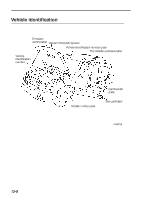2002 Subaru Forester Owner's Manual - Page 381
2002 Subaru Forester Manual
Page 381 highlights
For U.S.A. The following information has been compiled according to Code of Federal Regulations "Title 49, Part 575". Uniform tire quality grading standards This information indicates the relative performance of passenger car tires in the area of treadwear, traction, and temperature resistance. This is to aid the consumer in making an informed choice in the purchase of tires. Quality grades can be found where applicable on the tire sidewall between the tread shoulder and maximum section width. For example: Treadwear 200 Traction AA Temperature A The quality grades apply to new pneumatic tires for use on passenger cars. However, they do not apply to deep tread, winter type snow tires, space-saver or temporary use spare tires, tires with nominal rim diameters of 12 inches or less, or to some limited production tires. DOT quality grades - All passenger car tires must confirm to Federal Safety Requirements in addition to these grades. J Treadwear The treadwear grade is a comparative rating based on the wear rate of the tire when tested under controlled conditions on a specified government test course. For example, a tire graded 150 would wear one and one-half (1-1/2) times as well on the government course as a tire graded 100. The relative performance of tires depends upon the actual conditions of their use, however, and may depart significantly from the norm due to variations in driving habits, service practices and differences in road characteristics and climate. J Traction AA, A, B, C The traction grades, from highest to lowest, are AA, A, B and C. Those grades represent the tire's ability to stop on wet pavement as measured under controlled conditions on specified government test surfaces of as13-2













